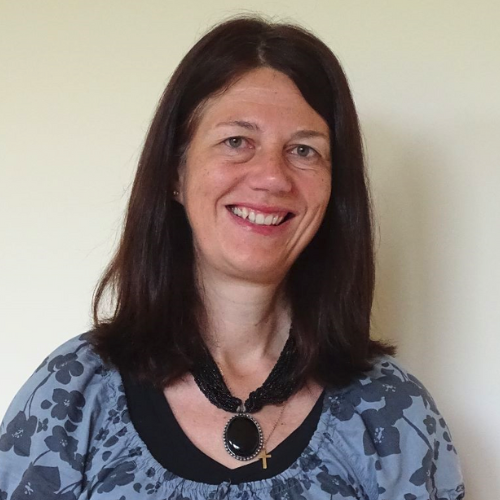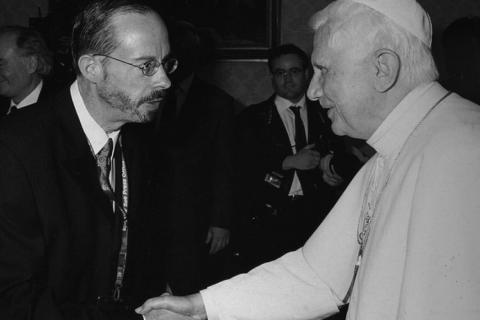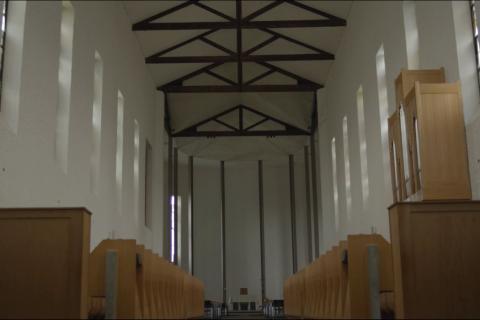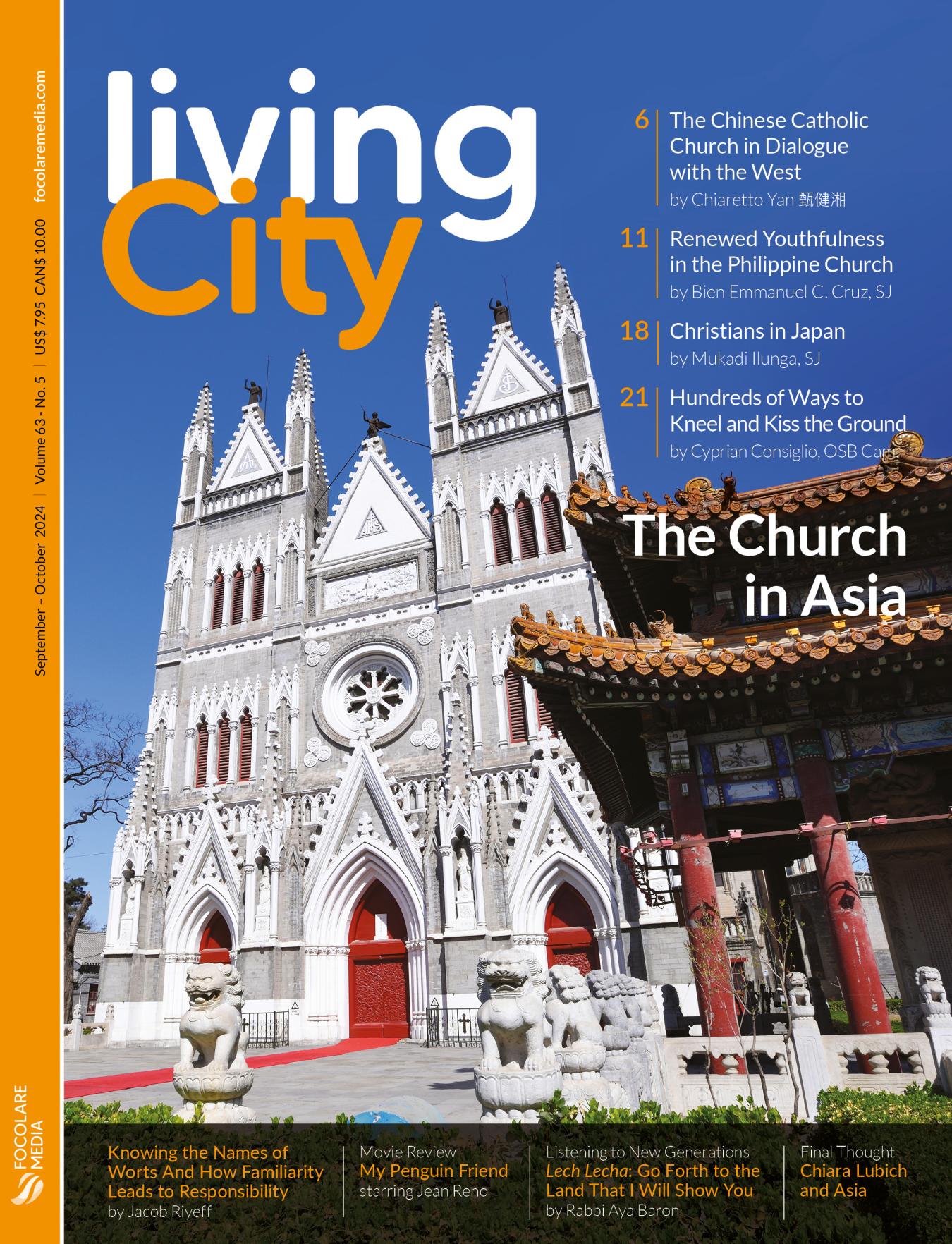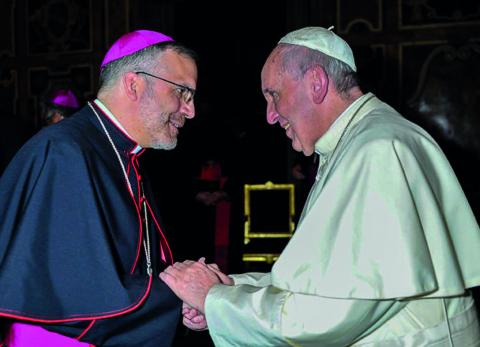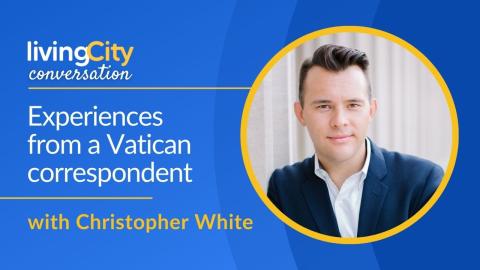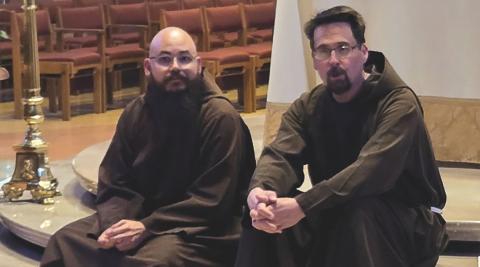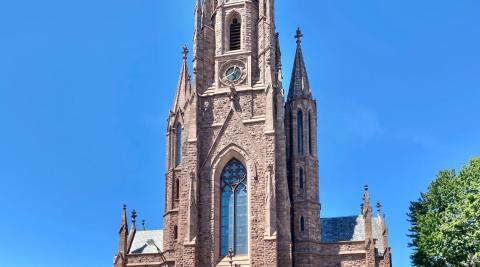Photo by wikipedia.com
When Pope Francis launched the idea of a synodal process, they were ready.
Many parishioners in northeast Baltimore had already hoped for a long time to share their thoughts, ideas and concerns, to discern together how to be a caring church in this time and this part of the world. To listen to one another, to the Holy Spirit — and to be listened to by those in the hierarchy of the Church.
Northeast Baltimore contains many underprivileged neighborhoods. With people who are homeless or addicted to drugs, or who simply feel like their lives went off the rails, these parishes are very different from those in affluent suburbs.
Yet many people are drawn to these communities because they offer many services to the poor — they are shepherds who are close to the sheep, parishioners who want to bring Catholic social teaching to life. Sometimes, the parishioners feel that their fellow Catholics or members of the clergy live in a different world than theirs.
With many parishioners already active on several committees, the parishes of St. Vincent de Paul and St. Anthony of Padua were quick to organize the listening process, spread the word and get people on board.
Nancy Conrad, a member of St. Anthony of Padua Church, was part of the international Young Christian Workers Movement and is still in touch with friends she made as a young adult. From them she got different perspectives on the synodal process.
“Catholics in Australia and Colombia are very excited about it. Here in the U.S., I don’t feel that everyone is open to this possibility to come together and take responsibility for the Church.”
Her parish had several listening sessions during Advent. Conrad sees the process as a big chance for the Church.
“We need to change. Right now, we are not talking to one another, and we are not taking into consideration the reality that many people are facing in their lives.”
She is concerned about poverty — a huge problem in her parish — because “people are so busy just making a living,” and she wonders: “What do we have to offer them? What do they find if they come to Church on Sunday? Maybe we’re not offering the support that people need.”
Conrad hopes that the synodal way will help different groups in the Church approach one another. “Synodality doesn’t mean to convince the other person of our way of thinking, but to listen and understand them better. Let us dream, as Pope Francis invited us to do.”
Hope for change
Pat Ball is part of St. Vincent de Paul parish, and she too appreciates the new syndodal setup. “I am really excited that the pope has opened up this opportunity to hear from so many people and that he is actively trying to engage with everybody, people that are no longer involved in the Church, people that are on the fringes.”
She continues: “We minister to a large homeless population in our parish, and we are hoping to get them involved, too. We want to hear what they have to say.”
What does she dream for the Catholic Church? “It’s my hope that there are going to be some changes, not always necessarily from the Vatican level, which is important in terms of setting doctrine and guidelines for ministry, but more importantly, what we do on the more local levels, in terms of the interaction between the laity and clergy. Synodality is supposed to be about co-responsibility, journeying together, being part of the ministry that we’ve been called to.”
A welcoming Church
Rudy Dehaney is coordinator of youth and young adult ministry in the Northeast Catholic Community parishes and knows about the struggles of young people. “They believe that the Church is not really active in doing anything outside of prayer and rituals. So, there is the hope that the Church does more for the poor and the marginalized. Pope Francis asks us to be an active Church.”
Dehaney sees the danger of the Church losing touch with the reality that these young people are living in. “They are interested in being involved in many different aspects of life, but we have yet to see the Church fully taking an approach where it would prioritize some of these more important issues, like how they treat marginalized people from different cultures and races, or people in the LGBT community. These are issues that we want to see addressed.”
His list does not stop there. “Caring for the environment. Solidarity in different forms, advocacy for the marginalized and the oppressed… Spirituality and having a relationship with God and Jesus is important, but there is a second great commandment that we need to see being fulfilled.”
Parishioner Pat Ball has another topic that she wants to bring attention to: “I am also very vocal about the Church recognizing women’s role in the Church. Women represent more than half the people that sit in the pews on Sunday, and yet their role is not really recognized yet.”
Learning about ourselves
Fr. Ray Chase, pastor of St. Vincent de Paul, is looking forward to the meetings. “We as a parish community are going to learn something from the process about ourselves, which should lead to [recognizing] where we are, and where we want to go as a parish community.”
His main point is that the road is the goal. “As a parish, we are committed to be on our journey together. I think that’s where the real beauty lies and the real opportunities emerge.”
He hopes that the process can be a chance to unify the Church, to see the vast richness of all its expressions, but everyone might not be open to that.
“Change has the ability to start excitement, but it also has the ability to stir fear, because all of us, regardless of our religious life, we all have our lives structured in a way that makes us feel comfortable, and change could make me feel less secure.”
Fr. Chase emphasizes that the process is not necessarily about change, but he notices that among his parishioners, “a lot of people are filled with hope that there may be a greater responsibility on their part.”
In his parish, the preparatory committee tried to make sure that the process doesn’t turn into a mere discussion. “Until now, we have focused on personal spiritual work. We asked each one to begin privately thinking of their own answers to the fundamental questions Pope Francis wants addressed. And subsequently, we will try a variety of listening sessions.”
Humble listening
“Part of the goal of the synodal process is people listening to each other,” says Raymond Heil, another member of St. Vincent de Paul, who is active on three committees and leads a theological discussion group. “The most important part in dialogue is listening. So, we could see some progress on that front, and I know that’s something that Pope Francis would like to see.”
Like many others, Heil is appalled to see how different opinions divide the Church. “Some people tend to think that they have the truth on their side, but anyone could fall into that; we have to be humble.”
A path for the Church
The Church in a divided country could benefit significantly if the synodal process is carried out with the right attitude
Archbishop William E. Lori of Baltimore wrote for the opening of the synod in his diocese: “The key to this whole process is not the plans we make, but rather our openness to the presence of the Lord in our midst. If we enter into discussions without having encountered the Lord in prayer — in Word and sacrament — and in reflection, even the best-planned process will not bear the good fruit of the Gospel.” He adds, “Encountering the Lord, we find the grace to walk together in mission.”
And in the end, this synod is not just an activity that will come and go, but one that might bring lasting change. “I guess what I would really like to see is that it will not end in 2023, but rather that this whole way of listening in the Church will continue beyond that point. So that this will really just be the beginning,” says Ball.
“Even if the only real result we see is a better communication at the local level, that will still be a good outcome.”


